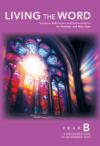Scripture Study for
Third Sunday of Advent
Zephaniah 3:14–18a / Isaiah 12:6 / Philippians 4:4–7 / Luke 3:10–18
<< Back to LECTIONARY RESOURCES
Understanding the Word
By Br. John R. Barker, OFM
The book of Zephaniah is marked by a strong and graphic emphasis on the destructive consequences of Israel’s infidelity to their relationship with God. One gets the clear impression from the rhetoric of the first part of the book that this relationship has come to a definitive end. This dire scenario nevertheless gives way to an ebullient oracle of hope, in which the divine protector of Jerusalem assures the holy city that God remains committed to the relationship. Indeed, God will rejoice over this people with gladness and joyfully renew them in love. The divinely ordained response: “shout for joy,” “be glad and exult,” “be not discouraged.” Judgment, as merited as it may be, is never final in God’s intentions.
Despite the troubles Paul has found in Philippi, which largely stem from the inability of some in the community to overcome their differences and to be united in Christ, the Apostle urges all of them to “rejoice,” and again, “rejoice.” Human troubles and infidelities must be attended to, but in the end, they must not be allowed to bring anxiety, because “the Lord is near.” While the Philippians, along with all Christians, await the consummation of God’s promises, they should ground themselves in trust in the Lord, turning to God for all their needs. If they can do this, then instead of anxiety they will experience God’s peace, which will keep them safe in Christ Jesus.
Although all four Gospels feature John offering a baptism of repentance, only Luke gives us a sense of what such repentance looks like, and it is unsurprising to anyone familiar with Israel’s scriptures. When the crowd asks what they should do to prepare for the coming of the Messiah, John reminds them of God’s expectation that those who have should take care of those who have not (Deuteronomy 15:10–11; Tobit 4:7). Tax collectors, who made their fortunes by collecting more than the Romans required, should stop, and soldiers (and everyone else) should likewise obey the Law and avoid greed. When the Messiah comes, John insists, he will bring salvation to those who have reformed their lives, but judgment to those who have not.
